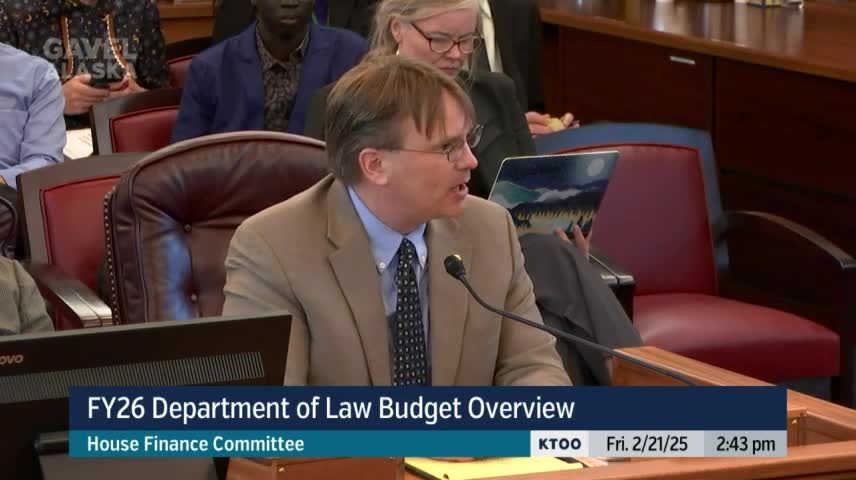Alaska Court System: pending cases falling overall, but judges and staff warn outliers remain and continuance practice is under review
Get AI-powered insights, summaries, and transcripts
Subscribe
Summary
Nancy Mead, general counsel for the Alaska Court System, told the House Finance Committee that pending case counts have fallen and that the court is tightening continuance practice while seeking modest facility and staffing adjustments for FY26.
Nancy Mead, general counsel for the Alaska Court System, told the House Finance Committee on Feb. 21 that the number of pending cases has dropped substantially in the past year and that the court system is working with prosecutors and defenders to reduce outliers that produce extremely long pretrial delays.
Mead said the system’s point‑in‑time count fell from over 15,000 pending cases on Jan. 1, 2024 to about 10,000 on Jan. 1, 2025. She characterized that shift as a sign the system is "on a good trajectory," while acknowledging that serious outliers remain and are "unacceptable." The court’s median times to disposition are substantially shorter than the longest delays critics have highlighted: Mead told the committee that median disposition times are about six months for many misdemeanors and C‑level felonies, and that A‑felony matters commonly take longer (she cited three years as an illustrative median for the most serious felonies).
Presiding judge order and continuance guidance Mead and Associate Counsel Noah Klein described a presiding judge order dated Feb. 8, 2024 intended to tighten continuance practice. The order and related guidance tell judges and parties that certain routine bases for continuances—such as waiting for a plea offer or general outstanding discovery—are not ordinarily considered good cause for an initial extension, and that courts should make case‑specific findings before excluding time from the speedy‑trial clock.
Budget items and staff vacancies The court system told the committee it is largely funded through the state general fund and that personnel costs are the largest component of its budget. The court reported a vacancy rate that has trended downward (from a peak near 13.3% to about 10.1% in the last calendar year) and said the current vacancy rate is near the funded level of 7.2%. The system’s FY26 UGF package asked for facility and lease cost adjustments (the court requested $552,000; the governor’s budget included $362,000), a final true‑up for court‑visitor costs that moved to the court system in prior sessions, and two therapeutic‑court positions partially funded by the Mental Health Trust.
Why it matters: Courts are the forum where discovery, continuances and disclosure obligations play out. The court system said it is taking administrative steps to accelerate disposition when parties are ready and to build clearer records when continuances are granted.
Ending: Mead and Klein urged continued coordination among the courts, prosecutors and defense counsel to keep cases moving; they requested modest facility and personnel adjustments in FY26 and said they would return with more detail if the committee requests further breakdowns.
